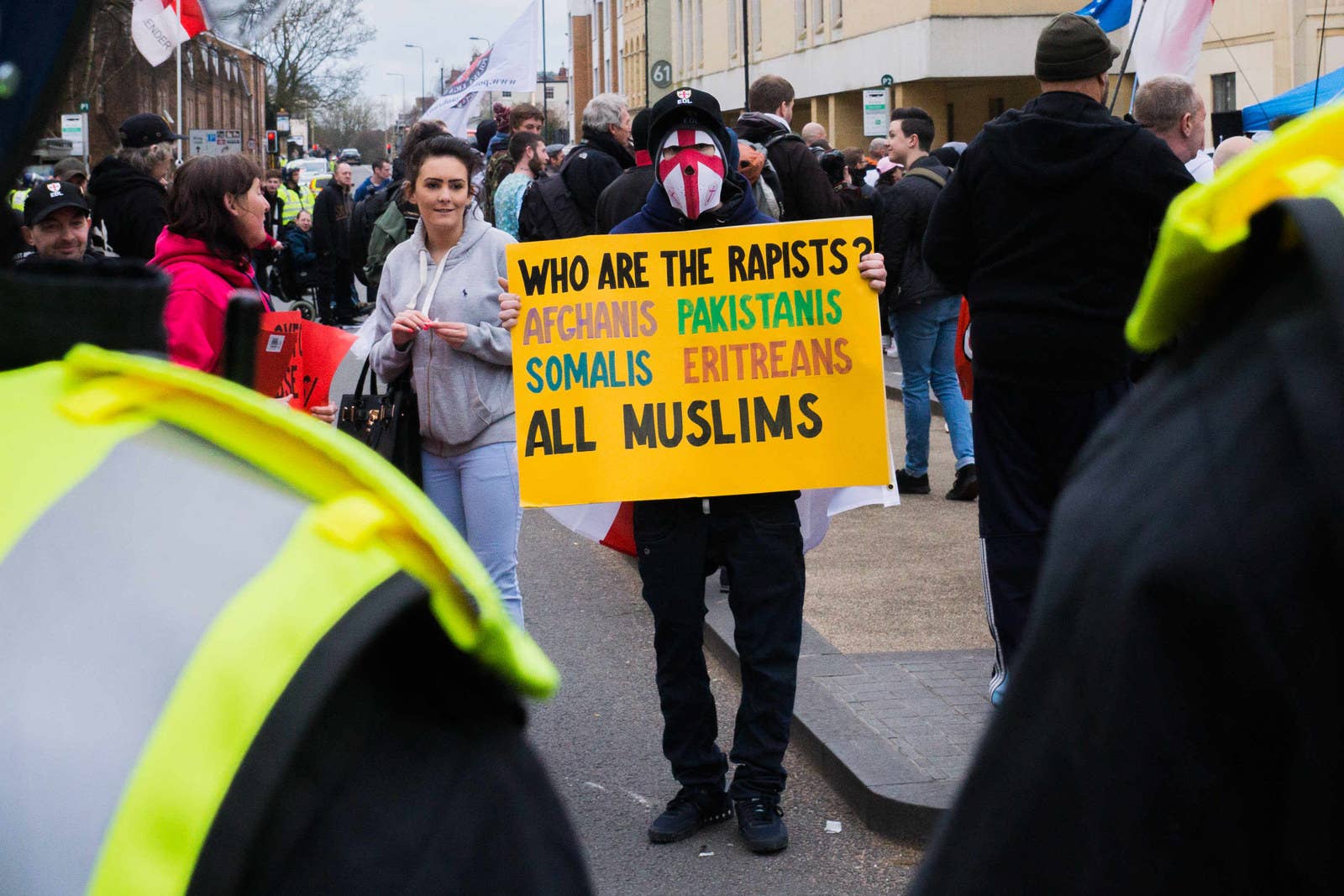
A woman in hijab was in Nottingham when a man she described as a “thug” approached her on Monday afternoon.
“I’m going to need you to lift your dress to see if that’s a bomb you have hiding under there,” he told her.
She is pregnant.
“I’m usually very confident and feisty, but I'm feeling a bit shaken, to be honest,” the woman, who wished to remain unnamed in fear of being targeted by further harassment, told BuzzFeed News. “It was the first time I've experienced something like this, and it's one of those things that you don't expect would happen to you. Plus the comment he made were extremely embarrassed and disturbing. It was sick of him to comment on my baby bump.”
Since Britain’s vote to leave the European Union, a series of xenophobic attacks against minority groups in public and online has stunned the country. The National Police Chiefs Council said there has been a significant spike in reporting of hate crimes since the result of the vote was announced on Friday. Many victims say the referendum result has served to legitimise racism in communities where an undercurrent of hatred already existed.
Henna Rai, a director of the Women Against Radicalisation Network and a close friend of the pregnant woman who spoke to BuzzFeed News, said the attack was not only “fuelled by hatred”, but was also “sexual harassment and a violation of her modesty”. Similar attacks have been reported around the UK, such as when a man berated a Muslim woman who wore a niqab at a shop in west London and when another confronted a Muslim woman in the street and demanded she “explain” the Brussels terror attacks. According to Rai, many Muslim women are reluctant to speak out, because they feel “extremely vulnerable and fearful due to the current climate”.
When women live in hostile or foreign environments, their worth is often defined by their bodies, which are seen as shells for procreation and little else. Migrant women are often described as "breeders" by far-right groups that believe migrants want to "overtake" the population. "Thank god for #Brexit," one tweet on Friday read. "Now we can stop Muslim migrants trying to out-breed British citizens."
Anna Vanzan, a professor of gender and Islam at the University of Milan, has said women who wear the hijab in particular are targeted because they visibly represent the faith.
“Muslim women and their external display of religious identity (i.e., the hijab) are viewed not only as obstacles to secularism and modernity or as the unwillingness to accept Western/European values,” Vanzan wrote, "but ... as one of the symbols of Muslims' ‘hate’ towards Western civilization and as proof they seek to destroy it."
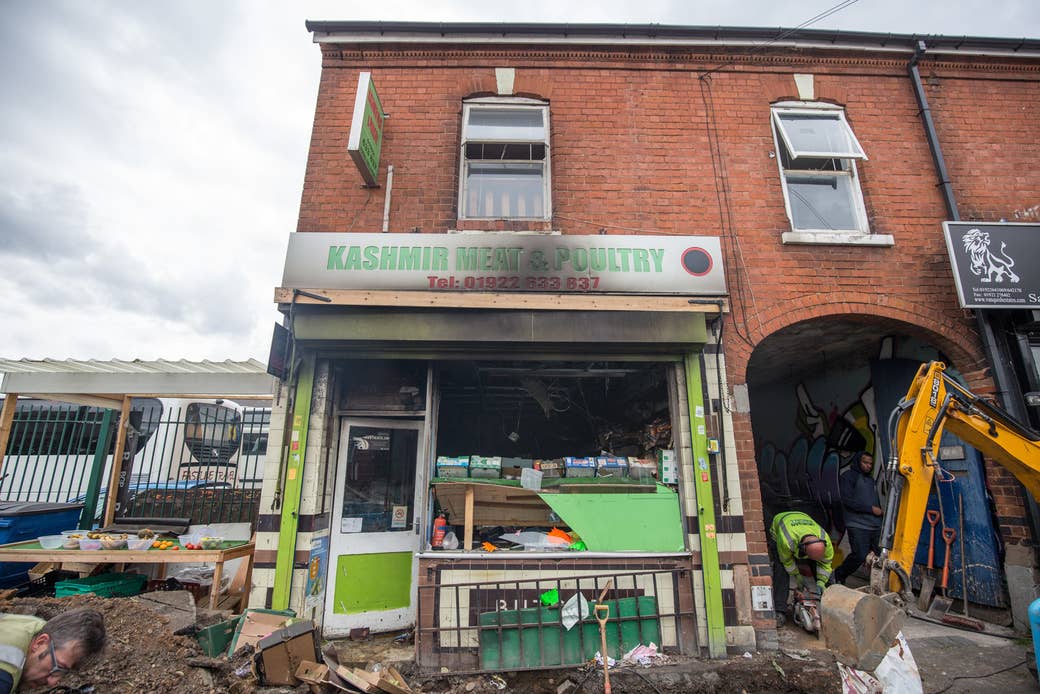
The experiences shared by the victims of xenophobic abuse appear to follow a similar pattern: The harassment is public, often verbal, the perpetrator is described as visibly angry or laughing, and, in most cases, the victim has been asked to leave the country.
In Glasgow, stickers that say “white zone” were plastered in parts of the city. The English Defence League, a far-right ‘movement’ in the UK, staged a rally outside a mosque in Birmingham. Police are investigating a racist graffiti found on the front entrance of a Polish centre in west London. On Monday evening, a petrol bomb was thrown into a halal butcher shop in Walsall. On Tuesday, Manchester police arrested three teenagers filmed allegedly yelling racist abuse at a passenger on a tram, telling the man to "go back to Africa". Such incidents have been condemned by the UN and prime minister David Cameron, while London mayor Sadiq Khan has reassured the public that police will be "extra vigilant".
A Welsh student who started a hashtag, #PostRefRacism, to document post-referendum racist attacks on social media, told BuzzFeed News he and his brother were harassed by a middle-aged white man. "We were having a drink when he told us that ‘we would never be true British’ and that he ‘didn’t care if we were here to be a doctor, or a lawyer, or whatever, just go back and do it in your own country'."
The student, who is moving to the US to study later this year, asked to remain anonymous because he fears he could be targeted by further abuse. “This was in the middle of the day, in broad daylight, in a fairly crowded student bar,” he said.
The student told BuzzFeed News that the most common type of messages or reported crimes he’s noticed has been verbal – comments like “we voted you out, why are you still here?” or “pack your bags, when are you going home?” But he has also documented cases of violent assault, vandalism, and group intimidation, the sort of thing people fear could snowball into physical assaults.
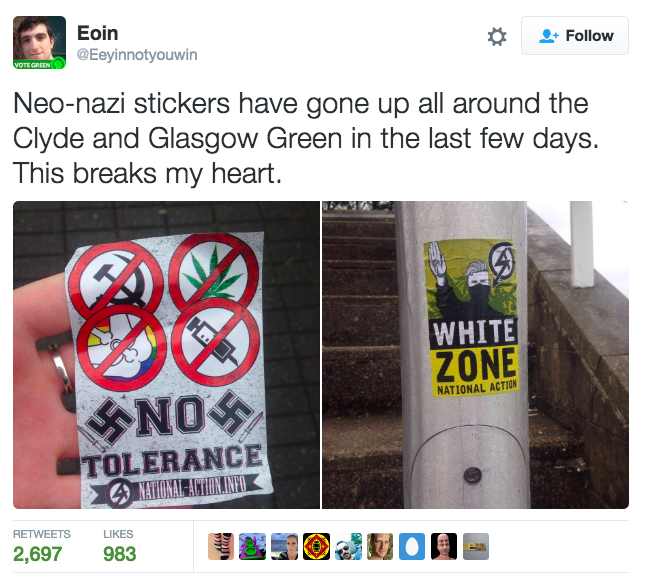
Tell Mama, a charity that supports victims of anti-Muslim hate in the UK, says 30 cases of anti-Muslim acts have been reported to them since Friday.
The charity’s founder, Fiyaz Mughal, told BuzzFeed News the majority of abuse reported from across the country has been verbal and targeted at Muslim women. The perpetrators, according to Mughal, have predominantly been white males between the ages of 17 and 45.
Although Tell Mama says the reported abuse is not as high as that experienced after terror attacks such as the Paris attacks last November, after which 151 incidents were registered in a single week, these cases are equally important to watch.
“The comments toward women have been very specific to the referendum, statements such as ‘we voted for you to leave, why haven’t you left?’,” said Mughal. “The more reports like these you get, the less Muslim women are comfortable going out, doing things, and living in their community.”
Mughal said “young, impressionable white males" are in danger of being influenced by extremist anti-Muslim ideology, and that “further hatred” will be further exacerbated by the Brexit result.
“Our concern is that Brexit is further reinforcing that thinking, giving credibility to that thinking, and giving confidence to it,” he said.
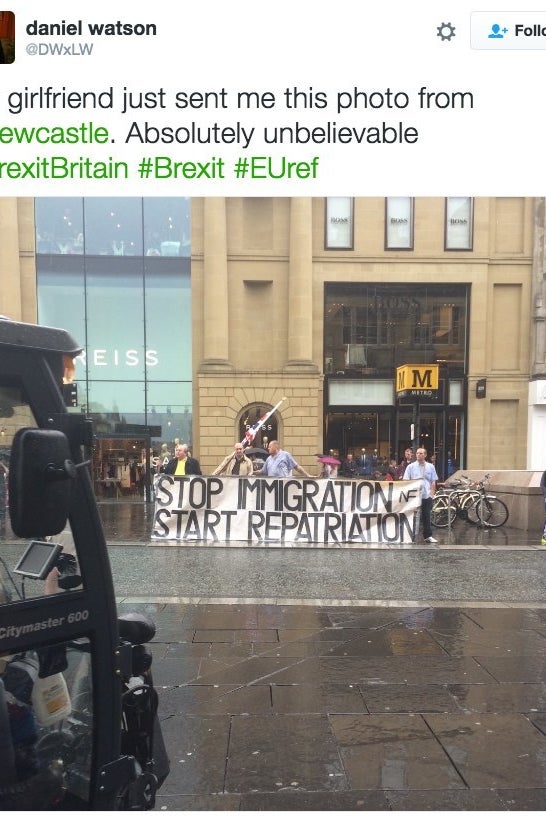
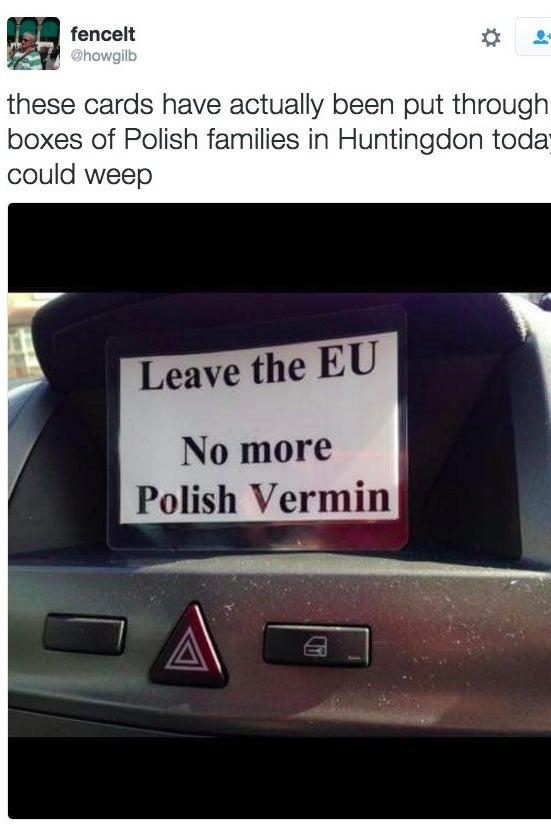
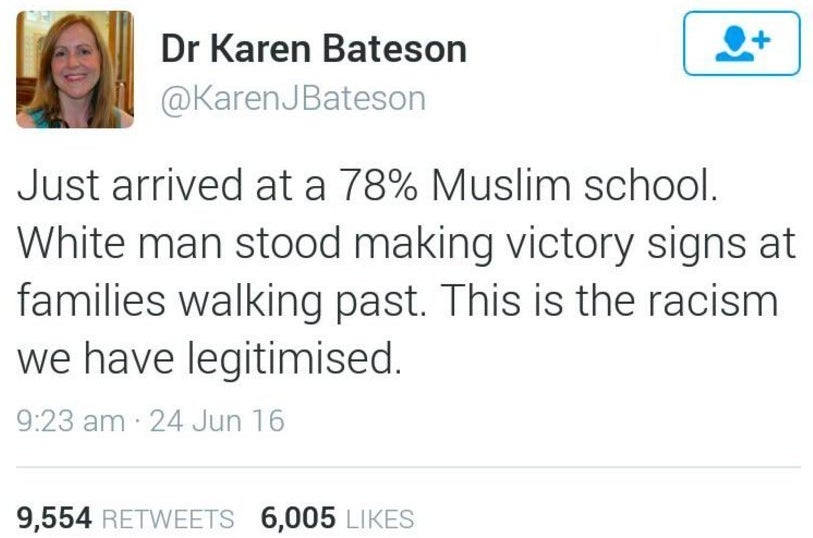
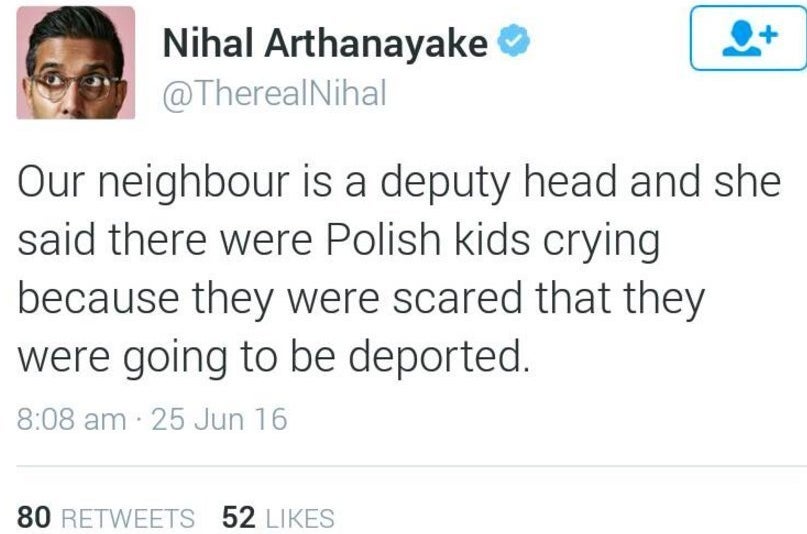
On Sunday, three British women – Sarah Childs, 32, Yasmin Weaver, 31, and Natasha Blank, 32 – began taking screenshots of racial abuse online and posting them on a Facebook album. By the evening, the trio began receiving an overwhelming amount of submissions, and created a Facebook group, Worrying Signs, that was joined by thousands of people within its first 24 hours.
Blank, who lives in Manchester, said the group has noted that a large number of those who have shared experiences of being targeted by racial abuse are black, Polish, or Jewish, but included people from all nationalities, races and religions.
“We don’t think everyone who voted Leave was a racist, and our group is not about berating people who voted Leave either,” Blank told BuzzFeed News. “But a lot of people have been saying that since the result, it’s as if something that was unpacked and put away has become overt and even more visible.”
Many who shared their experiences on social media said that although being subject to racism was not uncommon before the result of the referendum, it has intensified in the days following the vote.
Bahar, an English-born student living in London, has experienced this intimidation first-hand. When she heard that Britain had voted to leave the EU on Friday, she left the house to buy some ice cream to console herself, she said. While waiting in the queue at the shop, a white woman in her fifties turned around to look at her. Bahar said: “She stared at me and smirked and then she told me, ‘It’s time to start packing.'” No one in the shop said a word.
According to anti-racism charity Hope Not Hate, there has been a “disturbing” series of reports of racist incidents aimed at Polish, Muslim, and other communities since the Brexit vote. Following the rise of xenophobic abuse directed against the Polish community, the Metropolitan police said they were on “high alert”, while the Polish embassy said it was “shocked and deeply concerned” and urged people "who fall victim of xenophobic abuse and on all witnesses to report such incidents".
One Polish woman who works for the NHS said “everything has changed” since the vote and that she has feared for the safety of her two children in the last few days. The woman, who wants to remain unnamed but shared her experience on the Worrying Signs Facebook page, has been living in the country with her two children for 10 years – and is one of around 2 million Polish immigrants living in the UK. Since the vote, she said, she has received multiple comments from strangers in public telling her “no more Polish vermin”.
Her experiences over the last few days, she said, have made her rethink her life in England.
“I've given all my heart while working and looking after patients," she said. "All I want is for my children to have a better future, but now feel like that was a wrong decision."
Olivia, 17, moved to the UK with her Polish parents a decade ago. She believes the vote has made locals in her town more hostile towards Polish people.
“It has been different,” Olivia told BuzzFeed News via Facebook Messenger from her home in Liverpool. “It feels like I'm constantly being judged and about to be jumped ever since the vote. Some people never really bothered to hide the fact that they didn't like that I was Polish before, but it has got much worse since the Brexit vote. People keep glaring at me, and some have made comments like, ‘What is that Polish bitch still doing here?’ Usually they just mutter it on the bus, hoping I don't hear them.”
After Poland joined the EU in 2004, Polish migrants became the largest community of foreign citizens in the UK, accounting for about 15% of the total in 2016. Far-right parties in Britain have long pushed anti-Polish rhetoric to fuel anti-immigration views, such as calls by the British National Party for “the doors to be shut” on Polish workers.
Olivia said on her Facebook feed that she has seen an increase in videos of Polish flags being burned in unspecified locations and comments from people describing Polish people as vermin. “Quite frankly, I’m disgusted by the behaviour of some people, but the only sad thing is that we’re grown used to it,” she said.
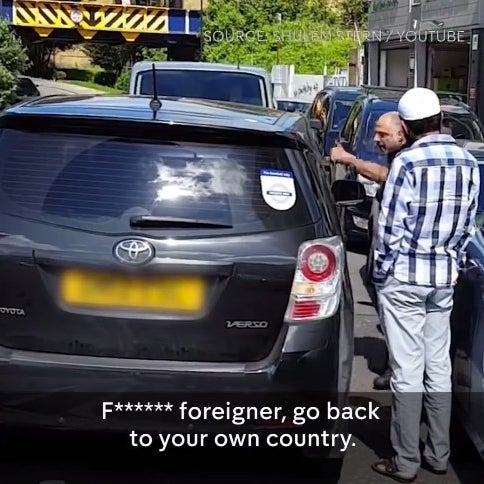
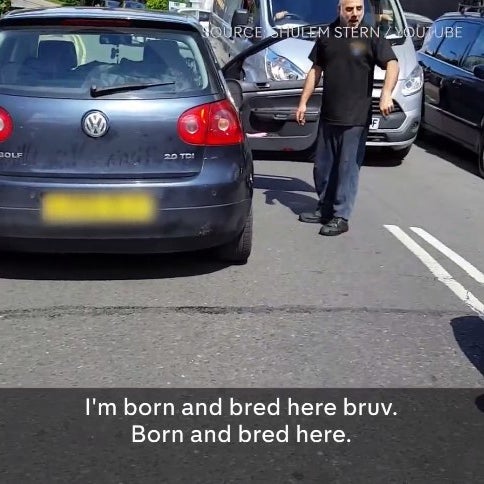
Following the vote, non-British EU citizens were left reeling with uncertainty: Would they be forced to leave the UK? Do they belong here? A shared sentiment shared by many BuzzFeed spoke to was that they no longer “feel welcome”.
As non-British EU citizens, Youxi Hu Chen and her husband couldn’t vote last week. They live in an area of the UK they say is “predominately white”, and said the people there have been always “lovely and kind”. After the vote, Chen said, she now feels reluctant to leave her home.
“Today is our anniversary,” she wrote on Facebook on Sunday. “I don’t feel comfortable going out for dinner.”
The couple are now considering leaving the country, but as she’s “put her roots down”, it is not that easy.
“I know I’m an immigrant, but I have never felt out of place before,” Chen told BuzzFeed. “I’m grateful towards the lovely English people who have accepted us. I can't tell you how much I love this place, for everything that Britain was before the vote. I still love this place, but I now feel self-conscious.”
